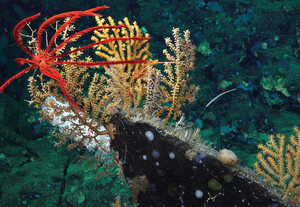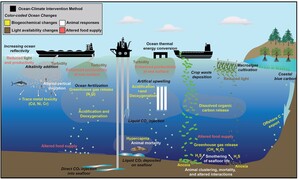
Image credit: Erick Cordes, Schmidt Ocean Institute
Image credit: Sarah Seabrook
 Researcher // Professor Moriaki YASUHARA, Associate Professor of the School of Biological Sciences and the Swire Institute of Marine Science
Researcher // Professor Moriaki YASUHARA, Associate Professor of the School of Biological Sciences and the Swire Institute of Marine Science Collaborators // The research is collaboratedinternationally and led by the University of California, San Diego
Ocean-based climate interventions (OBCIs) aim to address climate change by utilising the ocean's vastness. However, their potential impacts on deep-sea ecosystems are raising concerns. Our Marine Scientist, alongside an international team, evaluated these strategies.
One of the interventions involves injecting excess CO2 into the deep ocean to store carbon, a process that could harm marine life due to hypercapnia — a condition caused by elevated CO2 levels. Furthermore, techniques like ocean fertilisation, which promotes phytoplankton growth, and depositing crop waste in the deep sea may disrupt the food and oxygen availability for deep-sea life.
Given these risks, the team underscores the need for extensive research before implementing large-scale marine interventions. It is crucial to comprehend the deep sea's potential future impacts and ensure we take all necessary steps to protect its delicate ecosystems.
「基於海洋的氣候介入技術」(OBCIs) 是一種 旨在利用海洋作為工具,減輕氣候變化影響的技術和策略。然而,這些干預措施對深海生態系統和生物多樣性卻有着潛在的影響。此研究對這些干預措施作出分析,評估其對深海生態系統和生物多樣性的影響。
Journal paper: Deep-sea impacts of climate interventions (published in Science, 2023)
| < Previous | Next > |

